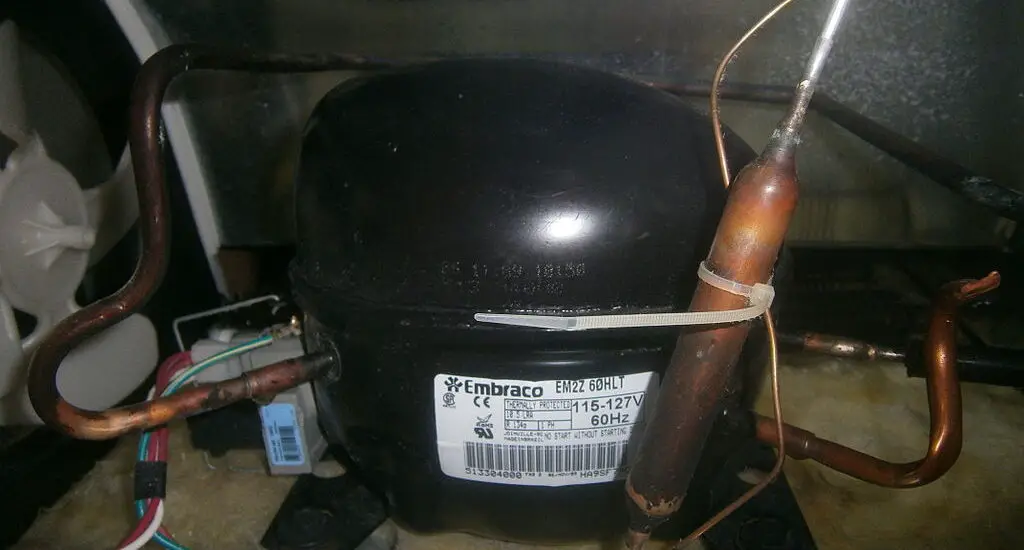If you’ve noticed that your refrigerator compressor is warm, it’s natural to feel concerned. This article will provide a step-by-step guide to understanding the causes of a warm compressor and how to take corrective actions.

Table of Contents
Why Your Refrigerator Compressor is Warm
Your refrigerator works by using a compressor to circulate a refrigerant through a series of coils. During this process, the compressor compresses the refrigerant, turning it from a low-pressure gas to a high-pressure gas.
This compression produces heat as a byproduct. A certain level of heat is normal because compressors are meant to operate at a warmer temperature than their surroundings.
However, when a compressor is too warm, it could be a sign of an underlying issue that may require your attention. In essence, some warmth is acceptable, but excessive heat can signal problems.
How to Determine If It’s Too Warm
To check if your refrigerator compressor is running hotter than it should be, you can perform a basic touch test. First, ensure your safety by unplugging the refrigerator from the electrical outlet.
Next, locate the compressor, which is typically situated at the back or underneath the refrigerator. Touch the compressor cautiously.
A normal compressor will be warm but not so hot that you can’t keep your hand on it for a few seconds. If the compressor is too hot to touch for even a brief moment, this is a clear sign that you need to investigate further.
Common Reasons Why Your Refrigerator Compressor is Warm
A warm compressor can result from a variety of factors. Here are some common culprits:
Blocked Condenser Coils
The condenser coils are responsible for dissipating the heat generated by the compressor. If these coils are dirty or blocked, they can’t perform their function efficiently, causing the compressor to run hotter than normal.
Inefficient Air Circulation
Proper ventilation is crucial for the compressor to release heat. Ensure that there is adequate spacing around the refrigerator and that the ventilation grills are not obstructed by dust or other objects.
Old Age of the Compressor
As compressors age, they may lose their efficiency, which can cause them to run warmer. If your refrigerator is old, you might need to replace the compressor.
Electrical Issues
Problems like faulty capacitors or relays can result in irregularities in electrical flow, causing the compressor to overheat.
Steps to Fix a Warm Refrigerator Compressor
Addressing a warm compressor involves several steps. Here they are:
Clean the Condenser Coils: Unplug the refrigerator and locate the condenser coils. Use a coil brush or a vacuum with an attachment to clean off any dust or debris. This will help the coils dissipate heat more efficiently.
You can get this 31 Inch Cleaning Brush For Dryer Lint Or Refrigerator Coil Cleaning from Walmart to clean the condenser coils.
Improve Air Circulation: Make sure there are at least a few inches of space between the refrigerator and the wall. Remove any objects that may be obstructing airflow. Clean the grille and make sure it’s not blocked.
Check for Electrical Problems: Unplug the refrigerator and carefully examine the capacitor and relay for signs of wear, corrosion, or damage. If you’re not experienced with electrical repairs, it’s best to call a professional at this stage.
Check out these other articles…
Refrigerator Compressor Does Not Shut Off: 3 Causes & Fixes
Does a Refrigerator Compressor Make Noise? Detailed Answer
How Does a Compressor Work in a Refrigeration System?
Bad Smell From Refrigerator Compressor: 3 Causes & Fixes
Roaches in Refrigerator Compressor: Proven Elimination Steps
When to Seek Professional Help
If you have tried the steps outlined above without success, or if you’re not comfortable performing these actions yourself, it’s time to consult a qualified technician. Electrical and mechanical issues can be complicated, and attempting to fix them without proper expertise could worsen the problem or compromise your safety.